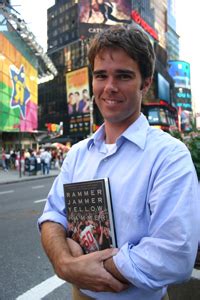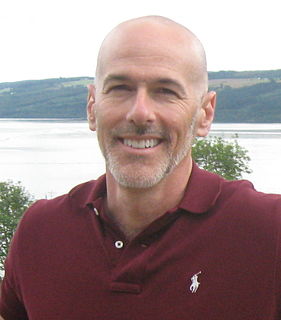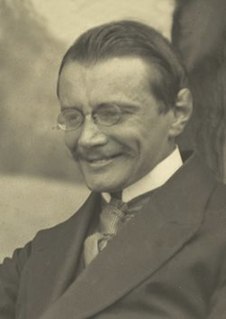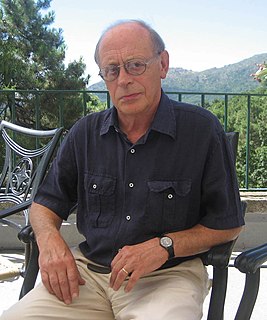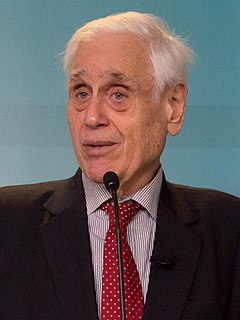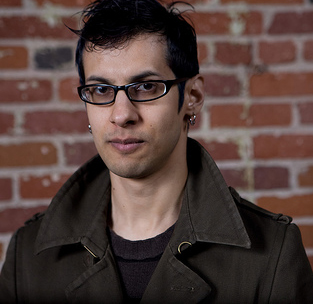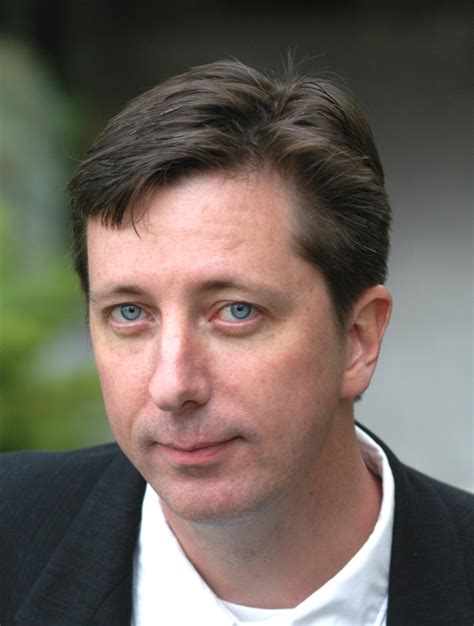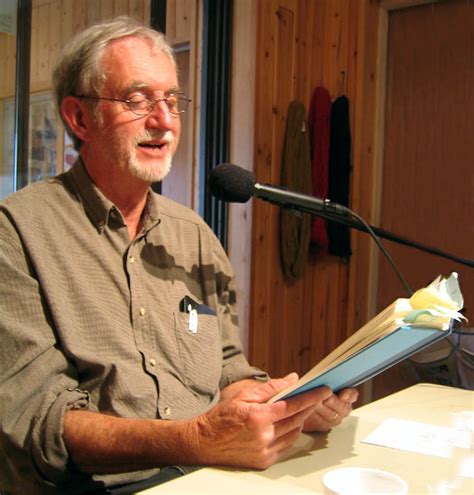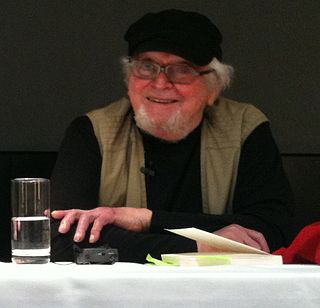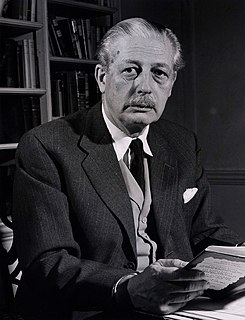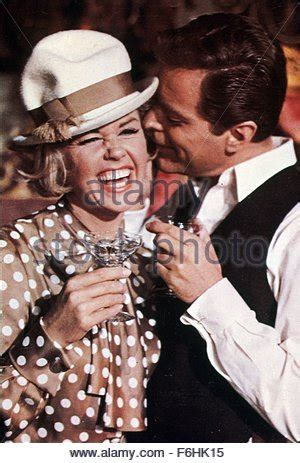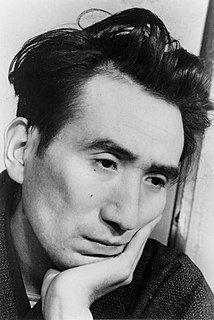Top 1200 Perhaps Quotes & Sayings - Page 6
Explore popular Perhaps quotes.
Last updated on November 25, 2024.
Vanity is so anchored in the heart of man that a soldier, a soldier's servant, a cook, a porter brags and wishes to have his admirers. Even philosophers wish for them. Those who write against vanity want to have the glory of having written well; and those who read it desire the glory of having read it. I who write this have perhaps this desire, and perhaps those who will read it.
To its devotees the bowtie suggests iconoclasm of an Old World sort, a fusty adherence to a contrarian point of view. The bowtie hints at intellectualism, real or feigned, and sometimes suggests technical acumen, perhaps because it is so hard to tie. BowTies are worn by magicians, country doctors, lawyers and professors and by people hoping to look like the above. But perhaps most of all, wearing a bow tie is a way of broadcasting an aggressive lack of concern for what other people think.
That this liberty [of the press] is often carried to excess; that it has sometimes degenerated into licentiousness, is seen and lamented, but the remedy has not yet been discovered. Perhaps it is an evil inseparable from the good with which it is allied; perhaps it is a shoot which cannot be stripped from the stalk without wounding vitally the plant from which it is torn. However desirable those measures might be which might correct without enslaving the press, they have never yet been devised in America.
There are two cardinal human sins out of which all others derive, deviate, and dissipate: impatience and lassitude (or perhaps nonchalance). On account of impatience they are driven out of paradise; on account of lassitude or nonchalance they do not return. Perhaps, however, only one main sense of sin is given: impatience. On account of impatience they are driven out, on account of impatience they do not turn back.
Religion is like our appendix, a vestigial remnant from a primitive past. Perhaps in a few millennia the god of Abraham will invoke the same curious amusement as rain and sun gods do today. Or perhaps our god will simply be shelved along with Zeus and Jupiter. Some day. But until then, we suffer the consequences of a population that believes in the absence of evidence and, more curiously, rejects an objective reality that conflicts with beliefs easily proven false.
You have perhaps waited for years to be freed from some need. For a long, long time you have looked out from the darkness in search of the light, and have had a difficult problem in life that you have not been able to solve in spite of great efforts. And then, when the time was fulfilled and God's hour had come, did not a solution, light, and deliverance come quite unexpectedly, perhaps quite differently than you thought?
You are accepted. You are accepted, accepted by that which is greater than you, and the name of which you do not know. Do not ask for the name now; perhaps you will find it later. Do not try to do anything now; perhaps later you will do much. Do not seek for anything; do not perform anything; do not intend anything. Simply accept the fact that you are accepted!
Money alone is only a mean; it presupposes a man to use it. The rich man can go where he pleases, but perhaps please himself nowhere. He can buy a library or visit the whole world, but perhaps has neither patience to read nor intelligence to see.... The purse may be full and the heart empty. He may have gained the world and lost himself; and with all his wealth around him ... he may live as blank a life as any tattered ditcher.
If I could blame it on all the mothers and fathers of the world, they of the lessons, the pellets of power, they of the love surrounding you like batter ... Blame it on God perhaps? He of the first opening that pushed us all into our first mistakes? No, I'll blame it on Man For Man is God and man is eating the earth up like a candy bar and not one of them can be left alone with the ocean for it is known he will gulp it all down. The stars (possibly) are safe. At least for the moment. The stars are pears that no one can reach, even for a wedding. Perhaps for a death.
The narratives we create in order to justify our actions and choices become in so many ways who we are. They are the things we say back to ourselves to explain our complicated lives. Perhaps the reason you've not yet been able to forgive yourself is that you're still invested in your self-loathing. Perhaps not forgiving yourself is the flip side of your stealing-this-now cycle. Would you be a better or worse person if you forgave yourself for the bad things you did? If you perpetually condemn yourself for being a liar and a thief, does that make you good?
A book is made from a tree. It is an assemblage of flat, flexible parts (still called "leaves") imprinted with dark pigmented squiggles. One glance at it and you hear the voice of another person, perhaps someone dead for thousands of years. Across the millennia, the author is speaking, clearly and silently, inside your head, directly to you. Writing is perhaps the greatest of human inventions, binding together people, citizens of distant epochs, who never knew one another. Books break the shackles of time ? proof that humans can work magic.
Looking back over a decade one sees the ideal of a university become a myth, a vision, a meadow lark among the smoke stacks. Yet perhaps it is there at Princeton, only more elusive than under the skies of the Prussian Rhineland or Oxfordshire; or perhaps some men come upon it suddenly and possess it, while others wander forever outside. Even these seek in vain through middle age for any corner of the republic that preserves so much of what is fair, gracious, charming and honorable in American life.
An audience will let you know if a song communicates. If you see them kind of falling asleep during the song, or if they clap at the end of a song, then they're telling you something about the song. But you can have a good song that doesn't communicate. Perhaps that isn't a song that you can sing to people; perhaps that's a song that you sing to yourself. And some songs are maybe for a small audience, and some songs are for a wide audience. But the audience will let you know pretty quickly.
I do not think I ever opened a book in my life which had not something to say upon woman's inconstancy. Songs and proverbs, all talk of woman's fickleness. But perhaps you will say, these were all written by men." "Perhaps I shall. Yes, yes, if you please, no reference to examples in books. Men have had every advantage of us in telling their own story. Education has been theirs in so much higher a degree; the pen has been in their hands. I will not allow books to prove anything.
The capacity for loving strangers, whether one thinks of them as fictional beings or stars one will never meet, is a profound reflection on the new consciousness whereby every individual leads his or life while aware of all the billions of other people on Earth. Perhaps it is a fantasy or a fallacy that we can feel for so many strangers. Perhaps it is a mask for selfishness. But no matter the modern stress on special effects, there isn't a sight in movies as momentous as shots of a face as its mind is being changed. And only movies have allowed that.
When a church reaches up beyond its group and tries to enforce its standards upon a society that doesn't accept these standards, and perhaps for good reason, perhaps for bad reason, but anyway this is the problem we face in pluralistic society, that not necessarily every standard that every church tries to enforce upon the society is from the society's standpoint a good standard.
Mr. Branwell and Mr. Carstairs seem to have no problem cleaning their boots,” Sophie said, looking darkly from Will to Tessa. “Perhaps you could learn from their example.” “Perhaps,” said Will. “But I doubt it.” Sophie scowled, and started off along the corridor again, her shoulders tightly set with indignation. Tessa looked at Will in amazement. “What was that?” Will shrugged lazily. “Sophie enjoys pretending she doesn’t like me.” “Doesn’t like you? She hates you!
Perhaps there may come into my art also, no less than into my life, a still deeper note, one of greater unity of passion, and directness of impulse. Not width but intensity is the true aim of modern art. We are no longer in art concerned with the type. It is with the exception that we have to do. I cannot put my sufferings into any form they took, I need hardly say. Art only begins where Imitation ends, but something must come into my work, of fuller memory of words perhaps, of richer cadences, of more curious effects, of simpler architectural order, of some aesthetic quality at any rate.
Perhaps all our loves are merely hints and symbols; vagabond-language scrawled on gate-posts and paving-stones along the weary road that others have tramped before us; perhaps you and I are types and this sadness which sometimes falls between us springs from disappointment in our search, each straining through and beyond the other, snatching a glimpse now and then of the shadow which turns the corner always a pace or two ahead of us.
I don't kill people. Perhaps it's just another inhibition to do away with it. Perhaps not. There's really no way of telling. It's possible I've just never been able to well up enough interest in any person to care long enough to end their life. I'd much rather avoid them altogether. Most of them. It's 4 A.M. and the sky is beautiful up and away from this room and this bed and the oppressive inevitability of sleep. I HATE SLEEP. But sleep always comes (that, or madness).
Next year he did not come for her. She waited in a new frock because the old one simply would not meet, but he never came. "Perhaps he is ill," Michael said. "You know he is never ill." Michael came close to her and whispered, with a shiver, "Perhaps there is no such person, Wendy!" and then Wendy would have cried if Michael had not been crying.
Knowledge of the truth I may perhaps have attained to; happiness certainly not. What shall I do? Accomplish something in the world, men tell me. Shall I then publish my grief to the world, contribute one more proof for the wretchedness and misery of existence, perhaps discover a new flaw in human life, hitherto unnoticed? I might then reap the rare reward of becoming famous, like the man who discovered the spots on Jupiter. I prefer, however, to keep silent.
Compared to other parents, remarried parents seem more desirous of their child's approval, more alert to the child's emotional state, and more sensitive in their parent-child relations. Perhaps this is the result of heightened empathy for the child's suffering, perhaps it is a guilt reaction; in either case, it gives the child a potent weapon--the power to disrupt the new household and come between parent and the new spouse.
Perhaps it was Maggie, perhaps not. In solitary moments magpies will perch on a branch and mutter soft soliloquies of whines and squeals and chatterings, oblivious to what goes on around them. It is one of those things, I suppose, intelligence now and then does, must in fact now and then do, must think, must play, must imagine, must talk to itself. ... What, finally, intelligence could be for: finding your way back.
I do not know why I care," Drizzt answered honestly. His eyes turned back to his ancient homeland, where loyalty was merely a device to gain an advantage over a common foe. "Perhaps I care because I strive to be different from my people," he said, as much to himself as to Bruenor. "Perhaps I care because I am different from my people. I may be more akin to race of the surface...that is my hope at least. I care because I have to care about something.
I like it when people are opinionated. I like an opinion. I like people that will fight for their opinion 'til an argument and through an argument. When they believe in something, they fight for it. I like those people that are perhaps sometimes too full of life - perhaps it's very difficult to be around them; they're not easy going. But I like being around people like that.
Truth as a cultural ideal has functioned as an opiate, perhaps the only serious opiate of the modern world. Karl Marx said that religion was the opiate of the masses. Raymond Aron retorted that Marxist ideas were in turn the opiate of the intellectuals. There is perspicacity in both these polemical thrusts. But is perspicacity truth? I wish to suggest that perhaps truth has been the real opiate, of both the masses and the intellectuals.
I have always been accused of taking the things I love – football, of course, but also books and records – much too seriously, and I do feel a kind of anger when I hear a bad record, or when someone is lukewarm about a book that means a lot to me. Perhaps it was these desperate, bitter men in the West Stand at Arsenal who taught me how to get angry in this way; and perhaps it is why I earn some of my living as a critic – maybe it’s those voices I can hear when I write. ‘You’re a WANKER, X.’ ‘The Booker Prize? THE BOOKER PRIZE? They should give that to me for having to read you.
My suspicion is that those who seem oblivious to suffering, whether it is nearby or in remote corners, are for the most part unaware, perhaps blinded by doctrine and ideology. For them, the answer is to develop a critical attitude toward articles of faith, secular or religious; to encourage their capacity to question, to explore, to view the world from the standpoint of others. And direct exposure is never very far away, wherever we live - perhaps the homeless person huddling in the cold or asking for a few pennies for food, or all too many more.
But perhaps more important, as someone wishing to make a comment or two about contemporary life and values, I don't have to dig through libraries or travel to exotic lands to arrive at a view of our modern situation refracted through the lens of the preindustrial world, or the uncommercialized, unfranchised, perhaps unsanitized-and therefore supposedly more "authentic"-perspective ofthe Third World. Very simply, this is because that "other" world, as alien as if separated by centuries in time, is the one from which I came
She couldn't think of anyone else who remotely resembled him. He was complicated, almost contradictory in so many ways, yet simple, a strangely erotic combination. On the surface he was a country boy, home from war, and he probably saw himself in those terms. Yet there was so much more to him. Perhaps it was the poetry that made him different, or perhaps it was the values his father had instilled in him, growing up. Either way, he seemed to savor life more fully than others appeared to, and that was what had first attracted her to him.
War is not a computer-generated missile striking a digital map. War is the color of earth as it explodes in our faces, the sound of child pleading, the smell of smoke and fear. Women survivors of war are not the single image portrayed on the television screen, but the glue that holds families and countries together. Perhaps by understanding women, and the other side of war ... we will have more humility in our discussions of wars... perhaps it is time to listen to womens side of history.
Too-lateness, I realized, has nothing to do with age. It’s a relation of self to the moment. Or not, depending on the person and the moment. Perhaps there even comes a time when it’s no longer too late for anything. Perhaps, even, most times are too early for most things, and most of life has to go by before it’s time for almost anything and too late for almost nothing. Nothing to lose, the present moment to gain, the integration with long-delayed Now.
That's why I want to speak to you now. To say: no person, trying to take responsibility for her or his identity, should have to be so alone. There must be those among whom we can sit down and weep, and still be counted as warriors. (I make up this strange, angry packet for you, threaded with love.) I think you thought there was no such place for you, and perhaps there was none then, and perhaps there is none now; but we will have to make it, we who want an end to suffering, who want to change the laws of history, if we are not to give ourselves away.
I think poetry can be a kind of secular way in which people can be led to approach the difficult parts of their life, where there's been loss, where there's sadness of a deep kind. If poetry can help people to be more at ease in expressing even to themselves a lot of the darkness and pain of ordinary human existence, then it's serving some kind of cultural role, perhaps more than a cultural role, perhaps it is serving something of a spiritual role.
The Bible became the book of books, but it is not one document. It is a mystical library of interwoven texts by unknown authors who wrote and edited at different times with widely divergent aims. This sacred work of so many epochs and so many hands contains some facts of provable history, some stories of unprovable myth, some poetry of soaring beauty, and many passages of unintelligible, perhaps coded, perhaps simply mistranslated, mystery. Most of it is written not to recount events but to promote a higher truth—the relationship of one people and their God.
Oh God, God, please come to me, please illumine me, please act in me and through me. I don't know what's right and what's wrong. I can't tell anymore. I could be doing what I feel is right and perhaps I'm deceiving myself. Perhaps it's all my ego and my vanity. Please show me what's right or don't even show me. Please just do it, whether it brings me happiness or unhappiness, riches or poverty, sorrow or joy. Please act in and through me. I love only you.
Days and nights passed over this despair of flesh, but one morning he awoke, looked (with calm now) at the blurred things that lay about him, and felt, inexplicably, the way one might feel upon recognizing a melody or a voice, that all this had happened to him before and that he had faced it with fear but also with joy and hopefulness and curiosity. Then he descended into his memory, which seemed to him endless, and managed to draw up from that vertigo the lost remembrance that gleamed like a coin in the rain - perhaps because he had never really looked at it except (perhaps) in a dream.
What a wonderful sleep it had been! Never had sleep so refreshed him, so renewed him, so rejuvenated him! Perhaps he had really died, perhaps he had been drowned and was reborn in another form. No, he recognized himself, he recognized his hands and feet, the place where he lay and the Self in his breast, Siddhartha, self-willed, individualistic. But this Siddhartha was somewhat changed, renewed. He had slept wonderfully. He was remarkably awake, happy and curious.
Could truth perhaps be a woman who has reasons for not permitting her reasons to be seen? Could her name perhaps be--to speak Greek--Baubo?... Oh, those Greeks! They understood how to live: to do that it is necessary to stop bravely at the surface, the fold, the skin, to adore the appearance, to believe in forms, in tones, in words, in the whole Olympus of appearance! Those Greeks were superficial--out of profundity!
Although I am still in favour of a National Government in these difficult times, and shall probably be found in the great majority of cases in the Government Lobby, there are some issues that have arisen, or are likely to arise, upon which I am unable to give the Government the support which it has, perhaps, the right to expect from those receiving the Government Whip. It occurs to me, therefore, that it would perhaps be more satisfactory if I was no longer regarded as being among the supporters of the present Administration.
We have focused on the miracle-thing and I think we often overlook the message of Hanukkah. To me, the core of the holiday is the cleaning of the temple.... The accomplishment was in restoring the temple to the purpose for which it was built. Now think of the temple as a symbol. Perhaps it represents my life. The world has tried to use me for its own (perhaps good, but none-the-less extrinsic) purposes. But now I can rededicate myself to my own original purpose.
Gender is not something that one is, it is something one does, an act... a "doing" rather than a "being". There is no gender identity behind the expressions of gender; that identity is performatively constituted by the very "expressions" that are said to be its results. If the immutable character of sex is contested, perhaps this construct called 'sex' is as culturally constructed as gender; indeed, perhaps it was always already gender, with the consequence that the distinction between sex and gender turns out to be no distinction at all.
It always comes back to our insecurities, as we say, "Oh, I'm not as good as you." So instead of accepting that perhaps I am not as good as someone else in some ways and being comfortable with who I am as I am, I spend all my time denigrating you, trying to cut you down to my self-perceived size. The sad problem is that we see ourselves as being quite terribly small. Instead of spending my time being envious, I need to celebrate your and my different gifts, even if mine are perhaps less spectacular than yours.
And no one has the right to say that no water-babies exist, till they have seen no water-babies existing; which is quite a different thing, mind, from not seeing water-babies; and a thing which nobody ever did, or perhaps will ever do. But surely ... they would have put it into spirits, or into the Illustrated News, or perhaps cut it into two halves, poor dear little thing, and sent one to Professor Owen, and one to Professor Huxley, to see what they would each say about it.
But I think that because they trusted themselves and respected themselves as individuals, because they knew beyond doubt that they were valuable and potentially moral units -- because of this they could give God their own courage and dignity and then receive it back. Such things have disappeared perhaps because men do not trust themselves anymore, and when that happens there is nothing left except perhaps to find some strong sure man, even though he may be wrong, and to dangle from his coattails.
Perhaps in the back of our minds we already understand, without all the science I've discussed, that something terribly wrong is happening. Our sustenance now comes from misery. We know that if someone offers to show us a film on how our meat is produced, it will be a horror film. We perhaps know more than we care to admit, keeping it down in the dark places of our memory-- disavowed. When we eat factory-farmed meat we live, literally, on tortured flesh. Increasingly, that tortured flesh is becoming our own.
Perhaps one cannot, what is more one must not, understand what happened, because to understand [the Holocaust] is almost to justify...no normal human being will ever be able to identify with Hitler, Himmler, Goebbels, Eichmann, and endless others. This dismays us, and at the same time gives us a sense of relief, because perhaps it is desirable that their words (and also, unfortunately, their deeds) cannot be comprehensible to us. They are non-human words and deeds, really counter-human.
I suspect that many of us, if given the chance to make one person in our lives love us more, would have no trouble in choosing where to point a finger. We are all needy, all vulnerable, all terrified that perhaps that person has an excellent reason to withhold affection. We shape our purposes to make ourselves worthy and often do not see until much later how it was love-or perhaps the lack of it-that both picked us up and dropped us off at crossroads.
Perhaps we humans are cosmic dwarfs; perhaps we are molecular giants. But there is no denying our mid-scale complexity. We humans live neither at the range of the infinitely small, nor at that of the infinitely large, but we might well live at the range of the infinitely complex. We live at the range of the most caring; we ourselves might embody the most capacity for caring.
Mother, recently I have discovered the one way in which human beings differ completely from other animals. Man has, I know, language, knowledge, principles, and social order, but don't all the other animals have them too, granted the difference of degree? Perhaps the animals even have religions. Man boasts of being the lord of all creation, but it would seem as if essentially he does not differ in the least from other animals. But, Mother, there was one way I thought of. Perhaps you won't understand. It's a faculty absolutely unique to man - having secrets. Can you see what I mean?
Too late for changes, too late perhaps for explanations and ideological webs, but the love goes on, the love goes on, blind to laws and warnings and even to wisdom and to fears. And whatever that love is, perhaps an illusion of a new love, I want it, I cant resist it, my whole being melts in one kiss, my knowledge melts, my fears melt, my blood dances, my legs open.
Perhaps there's another, much larger story behind the printed one, a story that changes just as our own world does. And the letters on the page tell us only as much as we'd see peering through a keyhole. Perhaps the story in the book is just the lid on a pan: It always stays the same, but underneath there's a whole world that goes on - developing and changing like our own world.
Windy or not, a day this beautiful has to be lived. The day is bright and clear, the sky blue, and the dry air feels light. A northerly wind stirs a primal urge to move. The geese feel it, and so do I. Perhaps it is a last internal vestige from a time, long ago, when we migrated with the seasons across open plains, following the animals we pursued for food. Perhaps that is why the sight of migrating geese arrests our attention, why we feel the pull. We want to go, to travel in fresh or moody weather, taking in each newly revealed vista.
We have laws to deal with people who defame other people's religion. We have laws to deal with people who try to blow up our citizens. We have due process. We have laws to deal with people who we capture during combat and war, but somehow Guantanamo Bay seems to be outside all that. And perhaps it's being maintained with the view to what people are talking about now, this idea of the "long war," that this is going to go on and on, and perhaps Iran is going to be next.
However small we are, we should always fight for what we believe to be right. And I don’t mean fight with the power of our fists or the power of our swords…I mean the power of our brains and our thoughts and our dreams. And as small and quiet and unimportant as our fighting may look, perhaps we might all work together…and break out of the prisons of our own making. Perhaps we might be able to keep this fierce and beautiful world of ours as free for all of us as it seemed to be on that blue afternoon of my childhood.

